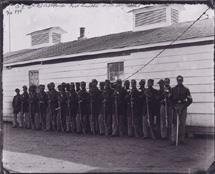 | ||||||||||||||
| ||||||||||||||
Co. E, 4th U.S. Colored InfantryAt the start of the Civil War, President Abraham Lincoln had little thought of ending slavery, and certainly did not think that Blacks should serve in the Army. However, by 1862, Lincoln began to realize that by forming Black regiments, he could undermine slavery and weaken an unexpectedly strong Confederate Army. Soon, after ending slavery in his Emancipation Proclamation of January 1, 1863, the North began to recruit Black regiments, heeding Frederick Douglass's plea: "Give them a chance, I don't say they will fight better than other men. All I say is, give them a chance!" By the end of the war, there were more than 190,000 soldiers in 166 Black regiments. More than 80 percent of soldiers came from Confederate states and most of these were former slaves. This photograph depicts Company E of the 4th U.S. Colored Infantry at Ft. Lincoln (defenses of Washington). Black soldiers suffered from racial discrimination even on the battle field. Seldom seeing active battle, they were expected to dig the trenches, bury the corpses, and build the roads. They were paid $3.00 per month less than the $10.00 per month that white soldiers received (although by 1864 this practice ended). Those few soldiers who were commissioned as officers were so harrassed by their superiors that they resigned. However, when Black soldiers did engage in combat, they often fought splendidly and with great courage. In the Confederacy, there was great reluctance to recruit slaves. Finally, in 1865, when the Confederate Army grew desperate for troops, a law was passed to enlist 300,000 soldiers. Unexpectedly, there were slaves willing to fight for the Confederate cause. An all Black unit was organized in Richmond, Virginia but the war ended before they had a chance to fight. Citation - Document 47 Additional Documents:
|
||||||||||||||
